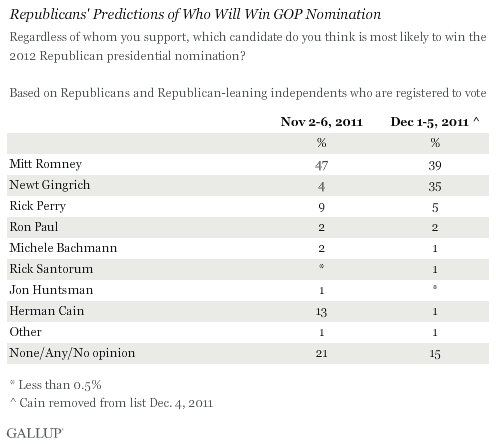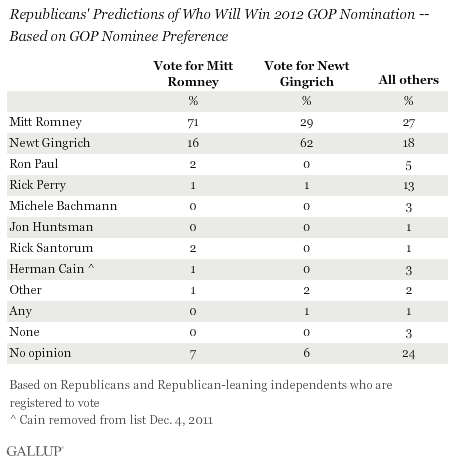PRINCETON, NJ -- Despite trailing Newt Gingrich by 15 percentage points in Republican preferences for the 2012 GOP presidential nomination, Mitt Romney slightly edges out the former House speaker by 39% to 35% in Republican registered voters' predictions of who will ultimately win. However, this is a shift from early November, when nearly half named Romney, 13% Herman Cain, and 4% Gingrich.

The Dec. 1-5 survey includes results from 1,227 Republicans and Republican-leaning independents who are registered to vote. No candidate besides Romney and Gingrich is currently a contender in the expectations battle. A combined 11% of Republican voters name some other candidate, while 15% are unsure. Cain is mentioned by 1% of respondents; his name was included in the question from Dec. 1-3, but removed on Dec. 4 after he formally suspended his campaign.
Romney led Cain, 47% to 13%, in predictions of who would win in Gallup's previous measure in early November. Cain tied Romney for the lead at that time in Republican nomination preferences, with Gingrich a distant third.
Both Romney and Gingrich Backers Smell Victory
Most Republican voters who support either Romney or Gingrich for the nomination believe their own candidate will win that battle; however, Romney's supporters are a bit more likely to be confident about this. Seventy-one percent of Republicans who back Romney say he will win, compared with 62% of Republicans who back Gingrich.
Among the remaining 41% of Republicans who support a different Republican candidate or have no preference, 27% predict Romney and 18% predict Gingrich will win the nomination, while a sizable minority -- 13% -- name Rick Perry. A quarter of this group is unsure.

Bottom Line
With Gingrich posing the most serious challenge yet to Romney's personal bid to be the 2012 Republican standard-bearer, Romney is also at risk of losing the air of inevitability about his campaign that may have contributed to his staying power thus far. Romney has trailed previously in the Republican trial heat, and it's possible he has also trailed in perceptions of who will win -- given that Gallup's only prior measure of this is from November. However, the timing of Gingrich's surging a month before the Iowa and New Hampshire voting clearly makes this situation different. Should Romney soon fall behind Gingrich in Republicans' predictions of who will win, that will be the ultimate signal that the framework for this nomination has changed.
Survey Methods
Results for this Gallup poll are based on telephone interviews conducted Dec. 1-5, 2011, on the Gallup Daily tracking survey, with a random sample of 1,374 Republicans and Republican-leaning independents, aged 18 and older, living in all 50 U.S. states and the District of Columbia.
For results based on the total sample of Republicans, one can say with 95% confidence that the maximum margin of sampling error is ±3 percentage points.
For results based on the sample of 1,227 Republican registered voters, one can say with 95% confidence that the margin of error is ±3 percentage points.
Interviews are conducted with respondents on landline telephones and cellular phones, with interviews conducted in Spanish for respondents who are primarily Spanish-speaking. Each sample includes a minimum quota of 400 cell phone respondents and 600 landline respondents per 1,000 national adults, with additional minimum quotas among landline respondents by region. Landline telephone numbers are chosen at random among listed telephone numbers. Cell phone numbers are selected using random-digit-dial methods. Landline respondents are chosen at random within each household on the basis of which member had the most recent birthday.
Samples are weighted by gender, age, race, Hispanic ethnicity, education, region, adults in the household, and phone status (cell phone only/landline only/both, cell phone mostly, and having an unlisted landline number). Demographic weighting targets are based on the March 2010 Current Population Survey figures for the aged 18 and older non-institutionalized population living in U.S. telephone households. All reported margins of sampling error include the computed design effects for weighting and sample design.
The questions reported here were asked of a random half-sample of respondents for five nights on the Gallup Daily tracking survey.
In addition to sampling error, question wording and practical difficulties in conducting surveys can introduce error or bias into the findings of public opinion polls.
View methodology, full question results, and trend data.
For more details on Gallup's polling methodology, visit www.gallup.com.
